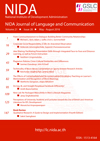Plagiarism Policies: Cross-Cultural Similarities and Differences
Keywords:
plagiarism, academic literacy, institutional policy, academic integrity, cultureAbstract
Certain key concerns regarding the challenge of academic writing often appear to be comparable across cultural settings; thus, similarities in plagiarism policies, as well, might seem unsurprising. Ironically, however, policy statements on university and comparable websites, representing Eastern and Western educational cultures, in Thailand and Canada, are consistent chiefly in terms of their unhelpfulness. They commonly endorse a narrow ethical perspective that oversimplifies the actual situation, and overall they convey the impression of aiming mainly to punish and disown students who use sources inappropriately rather than to guide them towards writing well. University and similar website statements deserve attention because they represent an institution’s public face and are obvious first reference points for teachers and students. Above all, their terms become high-stakes criteria when academic dishonesty is alleged, and especially if reputationally crucial compliance with national research funders’ regulations is also in question. In this paper, a representative sample of university and comparable websites from Thailand and Ontario (Canada) will be analyzed, encompassing large, prestigious universities and more modest institutions, and – in the case of Thailand – both state, private universities, and two research funding entities. In the general spirit of Price (2002), but adopting a broader framework, we seek evidence for institutional attention to four parts of the plagiarism puzzle: pedagogical viewpoint, rhetorical perspective, ethical standards, and management outlook. It emerges that – across both cultures – there is an urgent need for more enlightened policy leadership that eschews self-serving simplifications in favor of more constructive and better-informed responses.
Downloads
How to Cite
Issue
Section
License
By submitting a manuscript, the author transfers the copyright for the article to School of Language and Communication, National Institute of Development Administration (NIDA), if and when the manuscript is accepted for publication. Though the journal is an open-access, reproduction of any material published in NIDA Journal of Language and Communication for non-personal and/or commercial purpose requires a written permission from School of Language and Communication, National Institute of Development Administration (NIDA).






